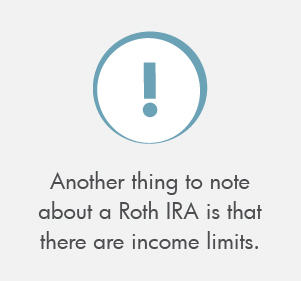Traditional and Roth individual retirement accounts (IRAs) are ideal for self-employed individuals who want to save for retirement. The former is a tax-deferred account, meaning you contribute pre-tax dollars, can write off your contributions on your tax return, and will pay taxes when you draw funds in the future.
With a Roth IRA, on the other hand, you contribute after-tax dollars. This means your investment will grow tax-free through the life of the account, and you won't have to pay taxes when you pull funds out at retirement.Roth IRAs are great for many reasons, but if you're considering opening one, there are a few things you should know. Our Oregon community credit union is here to walk you through the investment options, contribution limits, and distribution rules of a Roth IRA.
Investment options
A Roth IRA isn't an actual investment, but rather an account that holds several investments. This gives you the flexibility to choose between various high-yield bonds, stocks, and mutual funds. That said, there are professionally managed options for those who don't have the time or a comfortable amount of knowledge to pick and choose. Additionally, you can opt for a single-fund strategy, which takes the guesswork out of age-based investment portfolios.
Determining your Roth IRA risk tolerance
Your risk tolerance is essentially the level of loss you're willing to withstand from poorly performing investments. With a higher tolerance, you might take greater risks knowing there's a potential for a higher reward. However, most people have a relatively low-risk tolerance for their retirement accounts. In this case, choosing a more conservative investment and fewer high-risk stocks for your Roth IRA are recommended.
Contribution limits
The annual contribution limits for IRAs go up every few years. Currently, the limit is $6,000 for most individuals and $7,000 for those 50 years and older. This may not seem like enough to live on during retirement, but with compounding interest on your side, you can expect to see your contributions double or even triple.
For instance, if you put in $6,000 a year and earn an average of 6% interest annually, you'd have nearly $1,000,000 in 40 years. Or, as a more conservative estimate, let's say you earn 4% in annual returns. You'd still have about $600,000 in 40 years.

Roth IRA income limit
Another thing to note about a Roth IRA is that there are income limits. Individuals who make above $129,000 but less than $144,000 a year can contribute a reduced amount calculated by their adjusted gross income (AGI).
Those who earn $144,000 or more (or $218,000 if married and filing jointly), as well as those who are married and filing separately, can't contribute to a Roth IRA at all. However, there are no income limits for traditional IRAs, so if you're a high earner or are married and filing separately, you may want to consider opening a traditional account.
Distribution rules
Since Roth IRA contributions are pre-taxed, you can take distributions (meaning withdraw funds) tax-free and without penalty, once you're 59-and-a-half years old, as long as the account has been open for at least five years. If you're older than 59-and-a-half but haven't met the five-year requirement, you may have to pay a penalty.
Once the account has been open for at least five years, you can take distributions from a Roth IRA at any time up to the amount you've contributed. However, even though you've already paid taxes on the money, early distributions (taken out before the five-year mark) are typically subject to taxes and sometimes penalties.
First-home distribution exemption
Even after exhausting your contributions, you can take up to $10,000 from your Roth IRA earnings to purchase your first home without paying a penalty. This is an excellent option for many first-time homebuyers, but bear in mind that it can set you back several years in retirement savings.
Where should I open a Roth IRA?
You can open a Roth IRA with any financial institution that has IRS approval. This includes brokerage firms, traditional banks, and federally insured credit unions like CCCU.
Our community credit union offers a range of personal investing options, including traditional and Roth IRAs. What's more, members have access to independent financial advice and wealth management support.
We serve members throughout the metropolitan area, including Multnomah, Yamhill, Clackamas, Columbia, Washington, Clark, Skamania, and Hood River counties. We have a physical branch in Hood River and three in Portland. Plus, you can take advantage of our convenient mobile banking services.
We’re proud to provide our members with access to 5,600+ CO-OP Shared Branches and over 30,000 surcharge-free CO-OP ATMs nationwide.
Join today or contact us to learn more.



